11 Beer Ecommerce Stores Brewed on Shopify
We’ve rounded up a list of beer ecommerce brands leveraging Shopify and its integrations to serve up crisp store designs and refreshingly unique customer experiences.
Written By
Hannah Smiddy

Global alcohol ecommerce sales are predicted to increase to $42 billion by 2025, with the beer market amongst the categories projected to undergo the quickest growth.1
Beer demand online has escalated as a result of the Covid pandemic.2 What once was typically purchased as part of a weekly brick-and-mortar grocery shop is now frequently sought after online, increasingly direct from breweries themselves.
Speaking of breweries, the number of these leveraging a direct to consumer (DTC) ecommerce model has also risen due to the pandemic.2 Diversifying their business models to include online DTC selling has presented these companies with a number of benefits, not least the ability to continue trading during lockdowns.
Other advantages include the ability to ‘take control’ of the entire marketing and sales funnel, and access to a wealth of data direct from shoppers. Additionally, businesses have gained the chance to develop more meaningful relationships with their customers thanks to DTC selling.
For many of these beer ecommerce brands, Shopify is their commerce solution of choice. When you consider the calibre and scale of companies already leveraging the platform, or choosing to migrate to it, including global household names like Heinz, JB Hi-Fi and Mattel, it’s easy to see why.
Shopify is proving itself capable of powering small to medium-sized businesses (SMBs) and enterprise brands alike, supporting brands’ journeys from disruptive challengers to established enterprises with a gross merchandise volume (GMV) north of $500m. (We talk more about the scalability of Shopify in a previous article.)
DTC Shopify beer stores raising the bar
We’ve rounded up 11 beer brands who are using Shopify to stand out from the crowd in an increasingly competitive industry.
How are these ecommerce companies leveraging things like web design, subscription, social proof and rewards programs to convert and retain customers?
1. Jubel
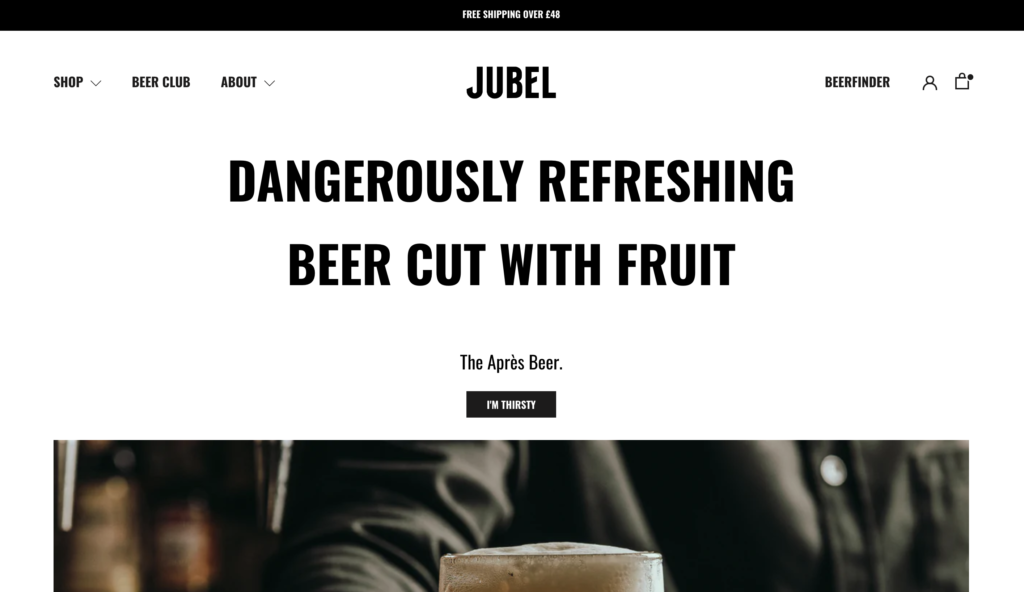
On a mission to “bring Après to the everyday”, British company Jubel specialises in craft lager cut with fruit. Since launching in 2018, the brand has become wildly popular with consumers, stockists and investors alike.
Jubel’s Shopify store is infused with witty humour that engages shoppers and speaks to the brand’s fun, laidback nature. From the “I’m thirsty” calls to action (CTAs), to the “We won’t go all Groupon on you” promise accompanying the email sign up form, customers can tell this is a company that doesn’t take itself too seriously.
A large dose of social proof is used at key touch points across this beer ecommerce store, particularly so on product pages. Here, star ratings, customer reviews, third-party endorsements and user-generated content are displayed loud and proud.
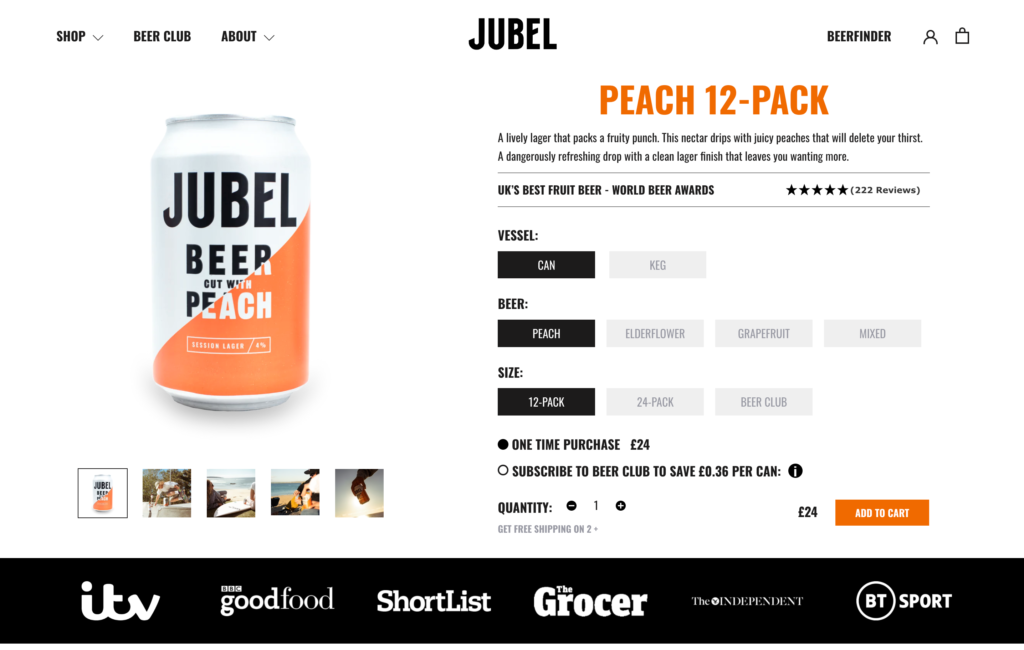
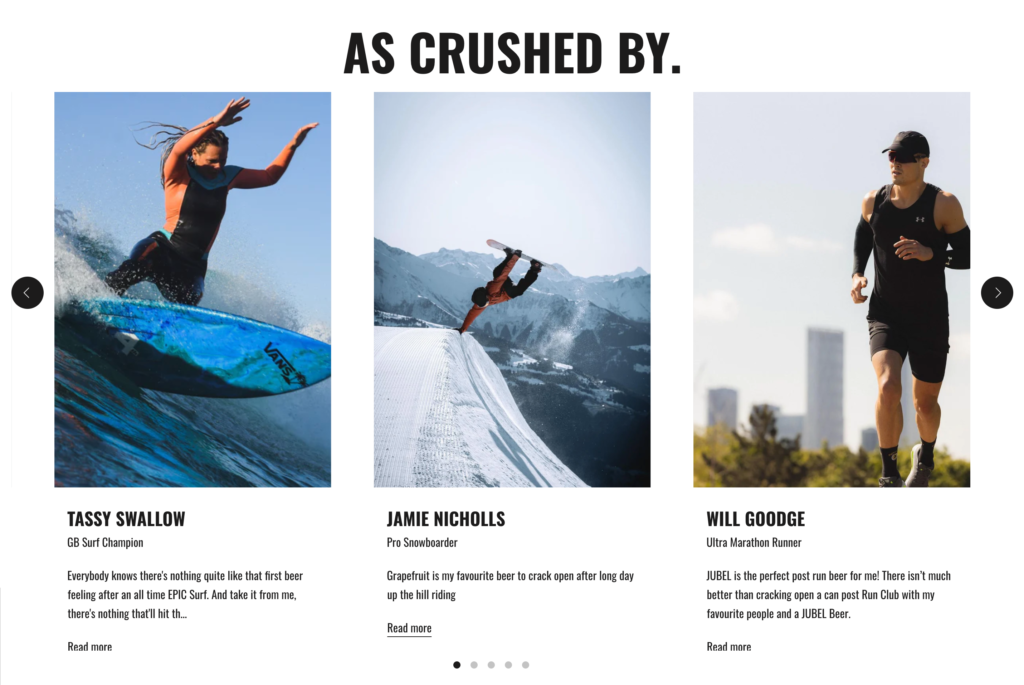
And, for shoppers who are particularly thirsty, Jubel offers a subscription to its Beer Club. Subscribers are promised a “full fridge for less”, with beer delivered at a frequency of their choice and a 10% discount. There are also perks such as member-only competitions, event tickets and brand partner offers to enjoy. Recurring orders can be edited or cancelled without any fuss too – catering to consumers’ need for flexibility.
Learn more from Swanky’s Head of Growth, Matt Abbott, about the importance of ecommerce retailers offering their subscribers flexibility in our guide to a successful food and drink subscription website.
2. Bridge Road Brewers
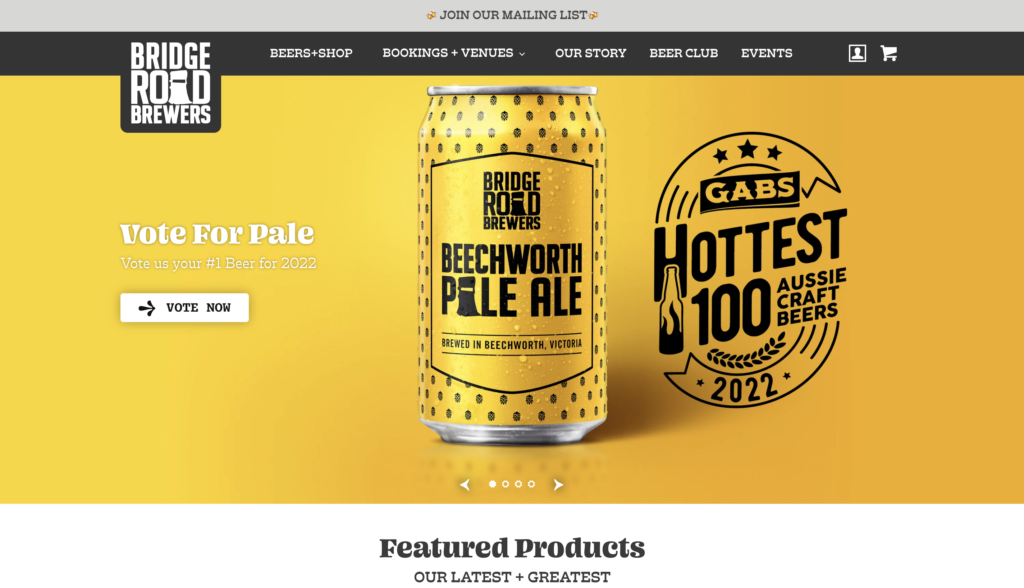
Bridge Road Brewers is an independent, family-owned brewery in Victoria, Australia. Its product offering includes a core range of drinks, as well as limited edition releases and merchandise.
The company closed an equity crowdfunding campaign in June 2022 after raising nearly AUD$1.5m. This gives the business a valuation of $52m.3
Fans of Bridge Road’s beer can sign up to the brand’s Beer Club subscription. Each shipment to club members includes a curated pack of fresh, seasonal beers, and is delivered every two or three months depending on the subscription tier.
The club also offers members special perks like exclusively-brewed beers, discounts and free tasting at its Beechworth venue. Member-only benefits like these can help nurture long-term relationships and improve customer retention by adding value to the brand experience. They are also helpful for attracting new customers.
3. Lost Craft
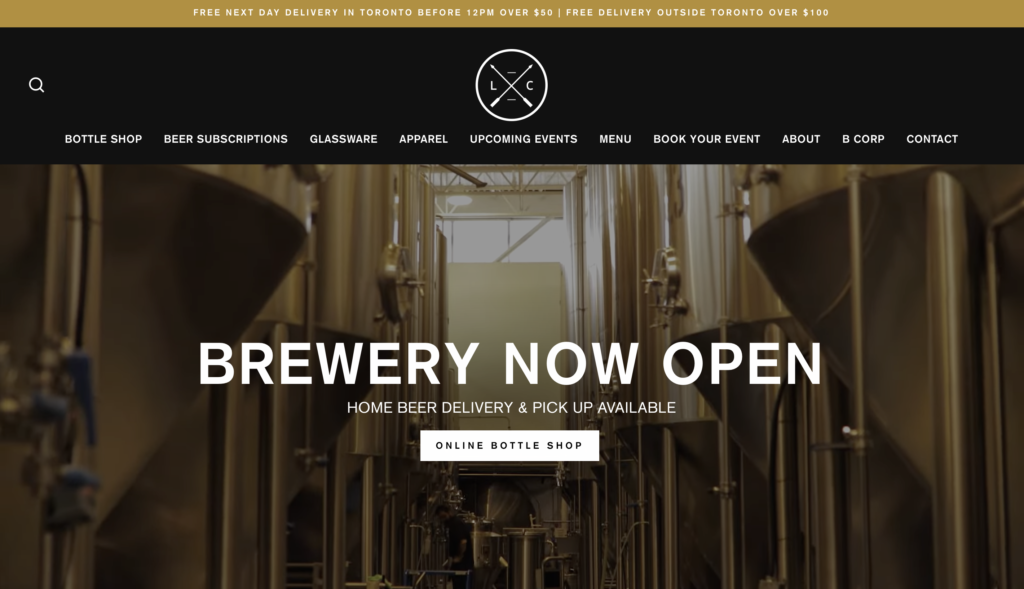
Toronto-based craft beer company Lost Craft focuses on brewing world-class session style craft beer with its “think global and drink local” philosophy.
Community engagement has been a key ingredient in the company’s journey so far. When setting out on their new business venture, founders Balraj and Shehan gathered insights from beer drinkers in the local community, as well as stores and bars. Their aim was to better understand what people wanted from a local craft beer brewery.
Eight years later, the Lost Craft team still prioritises listening to customer feedback. This can unlock significant benefits for ecommerce brands, including the ability to improve the customer experience, the cultivation of positive social proof, and an in-depth understanding of your customers.
Lost Craft customers can choose to subscribe and save when purchasing beers online, thanks to a simple replenishment subscription model. Automating the recurring delivery of their favourite beers saves consumers time and money. It also provides benefits to the brand, including reduced customer acquisition costs, better financial forecasting and better inventory management. We walk more about the benefits of subscription ecommerce in another article.
Another key feature of this Shopify store is the Craft 360 Rewards program, powered by Smile.io. This offers points for different actions, including signing up and placing an order. These points can be turned in a range of rewards, such as money off apparel and glassware.
As a beer ecommerce retailer, a loyalty program like this is an effective strategy for driving repeat purchases and nurturing long-term customer relationships. This is especially important in Lost Craft’s industry, where beer drinkers have so many online options to choose from.
4. Brewgooder
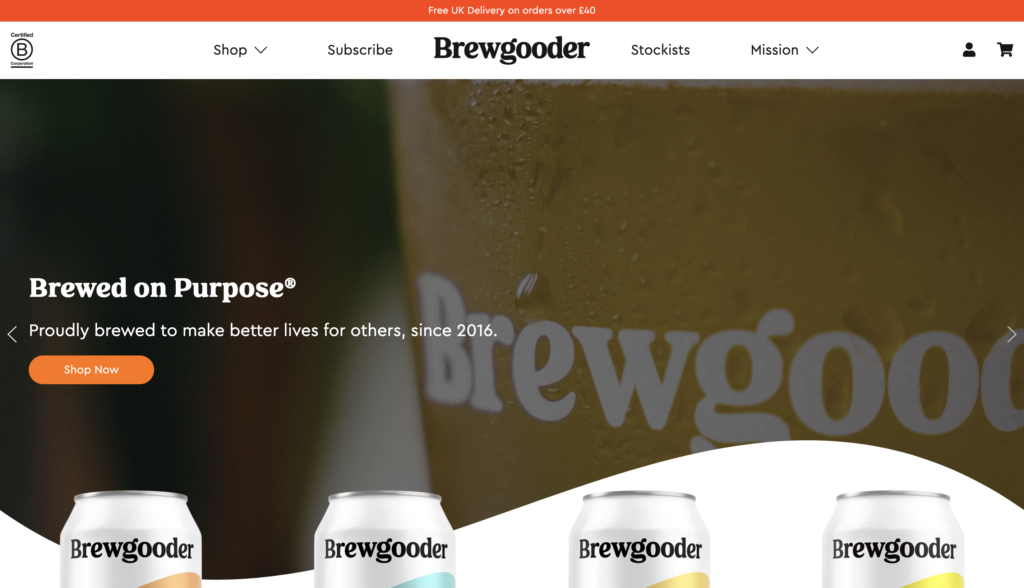
Socially-driven B Corp Brewgooder was brought to market in 2016 by two friends with a “shared passion for good beer and making an impact in the world”. The brand allows drinkers to make a positive difference to clean water projects with every pint.
Details of Brewgooder’s purpose are woven throughout its clean and colourful Shopify store, through a mix of written and visual content. The use of video to tell the company’s story is a great way to immerse consumers in the community spirit of Brewgooder, whilst boosting engagement metrics.
What’s more, customers are reminded at several touchpoints (both on and offline) of the positive impact they’re having on communities by purchasing Brewgooder beer. For example, on product pages you can see how many litres of clean water a purchase equates to.
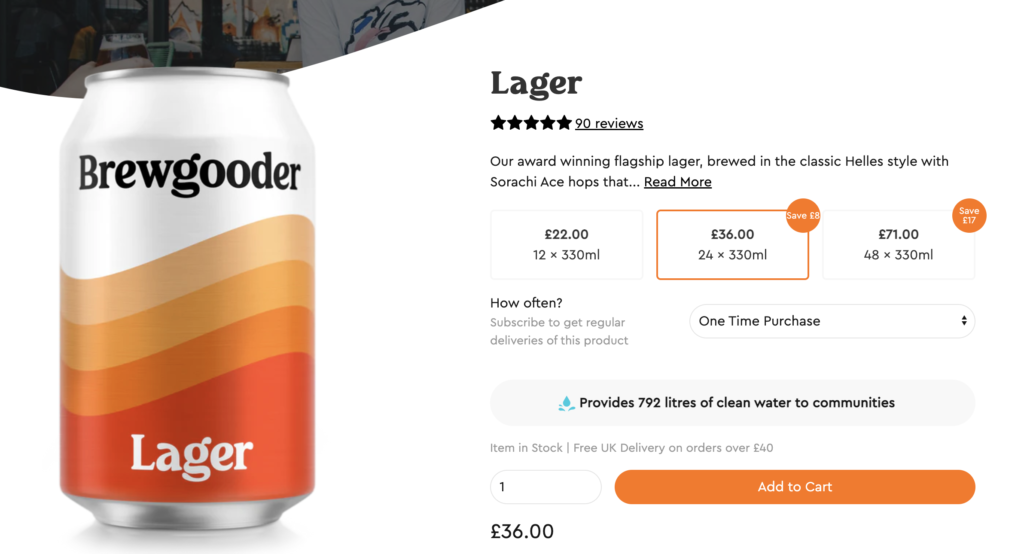
Meanwhile, on the beer cans themselves, consumers can scan a QR code to learn about the impact they’ve made in the world.
With today’s conscious consumers much more socially aware, reinforcing their positive impact like this is likely to forge emotional connections with empowered shoppers. Consequently, repeat purchasing is encouraged and loyalty to the Brewgooder brand is nurtured. We explain the psychology behind this in an article about the impact of corporate social responsibility on customer retention.
Brewgooder also offers a flexible subscription so that customers can keep their fridges full. Subscribers simply pick a beer, choose a quantity and select a delivery cadence. Crucially, they can pause or cancel at any time.
5. Sharp’s Brewery
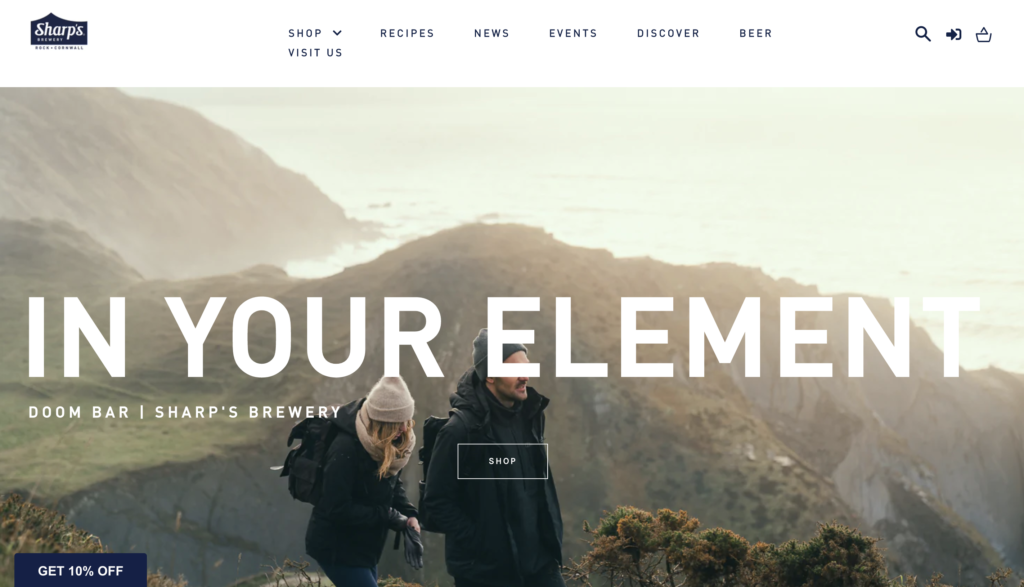
Founded in Cornwall in 1994, Sharp’s Brewery is best known for its flagship cask ale Doom Bar, a bestseller in the UK. With its passion for preserving the environment, partnership with South West charities and support of grassroot clubs, Sharp’s is also well known for its rousing commitment to the local area.
Sharp’s ecommerce store is hosted on Shopify and sells beers, merchandise and gifts direct to consumers.
Its blog features a range of engaging and relevant content, which serves to benefit customers and the brand alike.
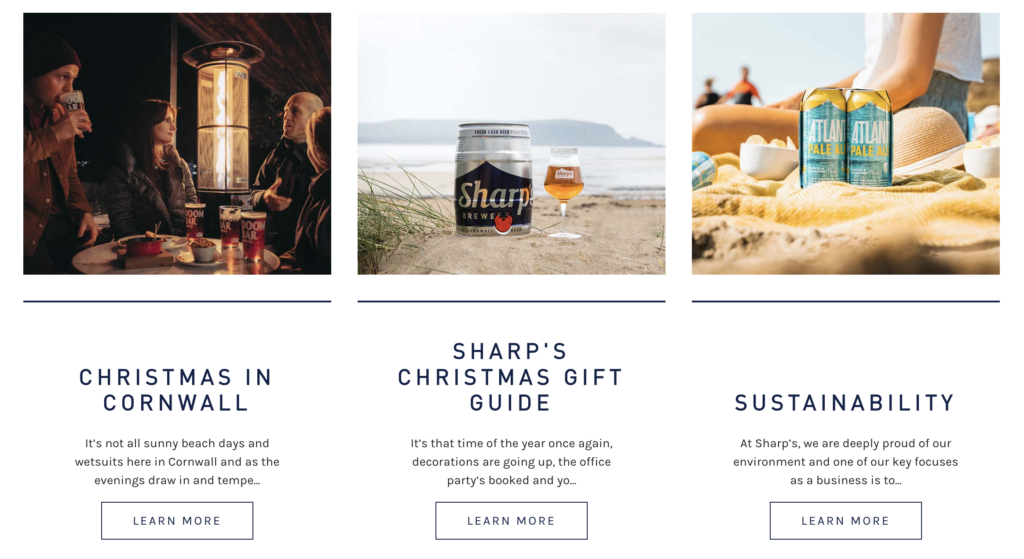
For customers, they can find helpful gift inspiration, discover new recipes that use or pair with beer, and learn about sustainability initiatives they can support alongside Sharp’s.
For Sharp’s, its blog is a key tool in the acquisition of new website visitors as well as the nurturing of existing customer relationships. Sharing authoritative content also helps position the company as a leader in the beer industry.
We speak more about the benefits of content marketing in another article.
6. Your Mates
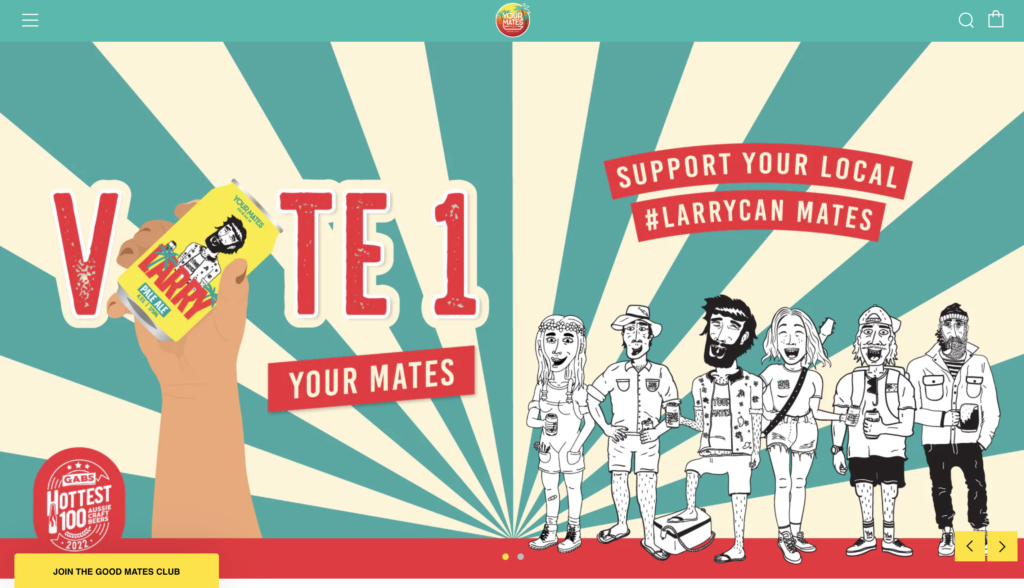
This fun and friendly beer ecommerce brand has captured the hearts and taste buds of beer drinkers across Australia. Since launching as a two-man garage operation in 2014, Your Mates has transformed into one of the country’s most popular independent beer companies with over 50 employees.
Your Mates’ Shopify store channels the brand’s fun and laid back nature with a vibrant colour palette, cheerful illustrations and relaxed copy. The written and visual content across the site speaks to values such as equality, loyalty and friendship, perfectly encapsulating the brand’s passion for ‘mateship’.
The brand leverages Klaviyo, a marketing automation platform that Swanky partners with, to maintain email communication with members of the “Good Mates Club” and keep them up to date with all the latest product and company news. Regular emails can foster meaningful customer connections, providing value beyond a shopper’s initial purchase. This is important for encouraging repeat purchases and maintaining higher levels of customer lifetime value.
7. To Øl Beer
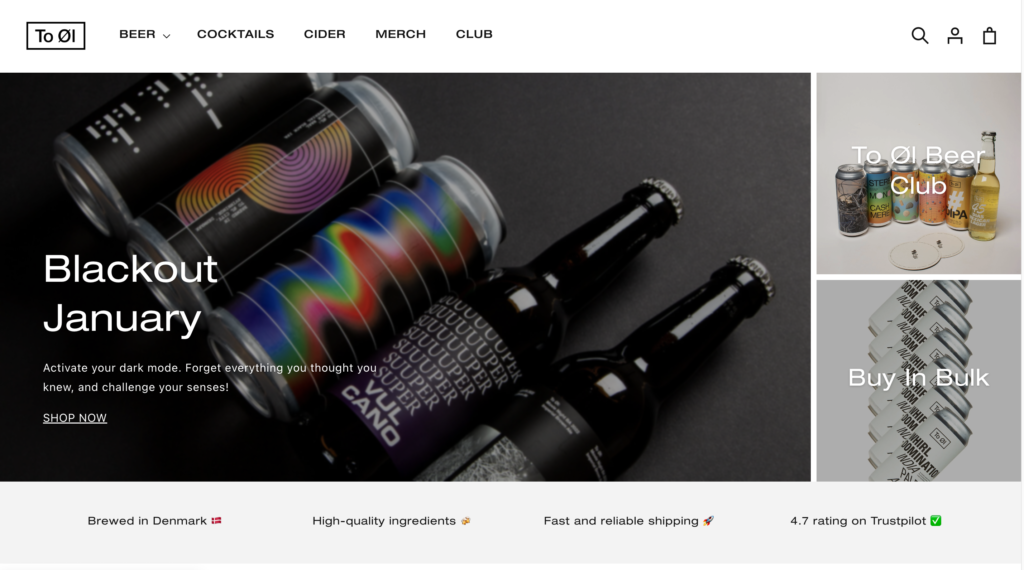
Contemporary craft beer company To Øl was officially established in Denmark in 2010, after a home-brewing project transformed into something much bigger. It brews a wide range of potent, provocative, fresh and floral beers, and prides itself on “pushing the boundaries of great beer-crafting”.
To Øl’s contemporary focus is reflected in a modern Shopify store design with a simple black and white colour palette. Product images on collection pages have subtle movement upon rollover, adding a dynamic element to this minimalist website.
Users are provided with a streamlined navigation experience thanks to an intuitive mega menu which allows them to shop by taste (e.g. hoppy, fruity, sweet) and style (e.g. IPA, stout, low ABV). This is important for connecting intent-driven shoppers with the products they’re seeking as quickly and efficiently as possible.
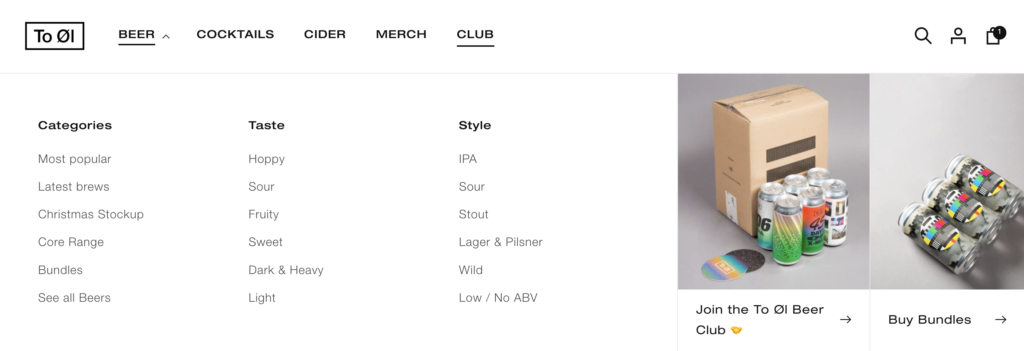
The path to purchase is further expedited with an add to cart CTA button featured directly on collection pages. This allows customers to skip the product page altogether.
Like many of the brands in this list, To Øl offers beer club membership. Signing up to the club will get you a box of six beers every month and access to a digital tasting magazine. Members can also enjoy perks such as 10% discount on online one-time purchases, money off at To Øl’s in-person bottle shops, and exclusive deals on festivals.
To Øl encourages members to join its Club Group on Facebook. By creating a brand community like this, the brand is uniting its customers around their shared love of craft beer. This can be a very effective strategy to make your brand experience more appealing and add value for subscribers, all whilst improving customer-company identification. In turn, this encourages brand loyalty, creates brand advocates and improves retention.
8. Beavertown Brewery
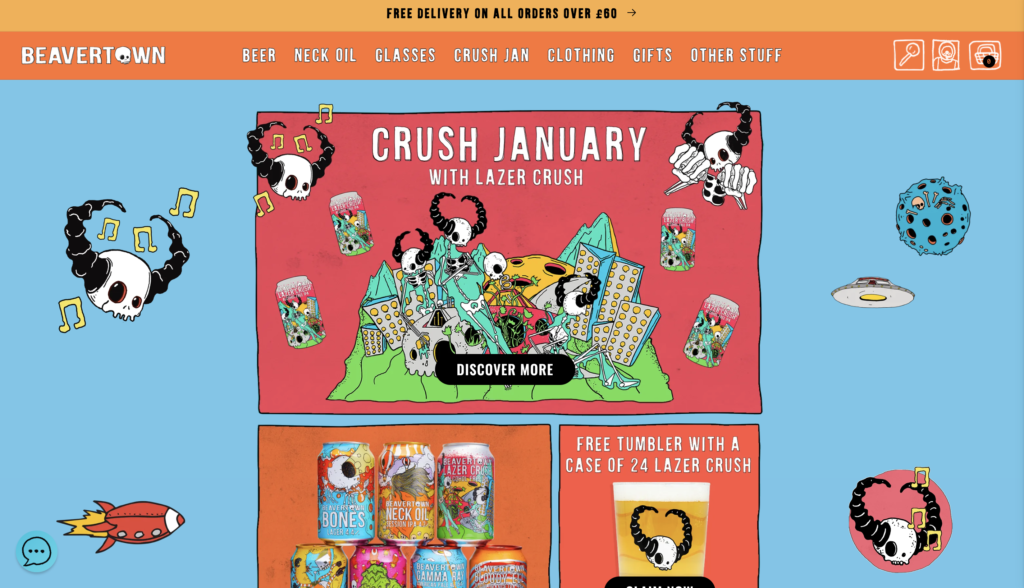
British beer brand Beavertown Brewery first started brewing in London in 2011.
With its unique personality and large dose of humour, the brand’s Shopify website serves up an enjoyable user experience. A combination of quirky illustrations, witty one-liners and colourful web design make for a creative and innovative digital space – aligning perfectly with what Beavertown is all about.
It’s not all about looks though. An intuitive navigation menu directs users to relevant collections, whilst over on collection pages a series of helpful filters allow customers to narrow down products even further (e.g. filtering by price, product type, alcohol percentage, size).
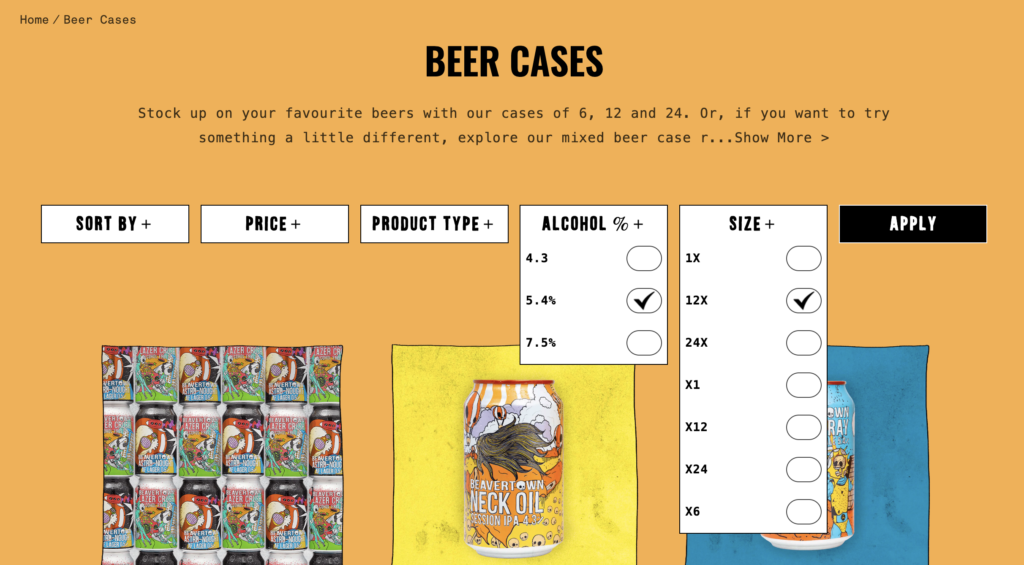
Customers can get a case of their favourite Beavertown beers delivered each month with the brand’s “Skullscription”. A carefully crafted subscription landing page clearly outlines the benefits for subscribers, including money-savings, flexibility and easy cancellation, painting an appealing picture for consumers. This page also anticipates common customer questions and provides clear answers in a FAQ listing – important for giving clarity and reassurance to users and reducing barriers to purchase.
Beavertown makes use of a product bundling strategy on its beer ecommerce store too. Product bundles provide customers with a curated assortment of products, typically at a discounted cost. For example, customers can buy a ‘Tempus Tasker Kit’ consisting of three bundled Tempus bottles, available at a cheaper price than purchasing the bottles individually. A strategy like this can increase average order value, boost revenue and drive awareness of new products.
9. Beer52
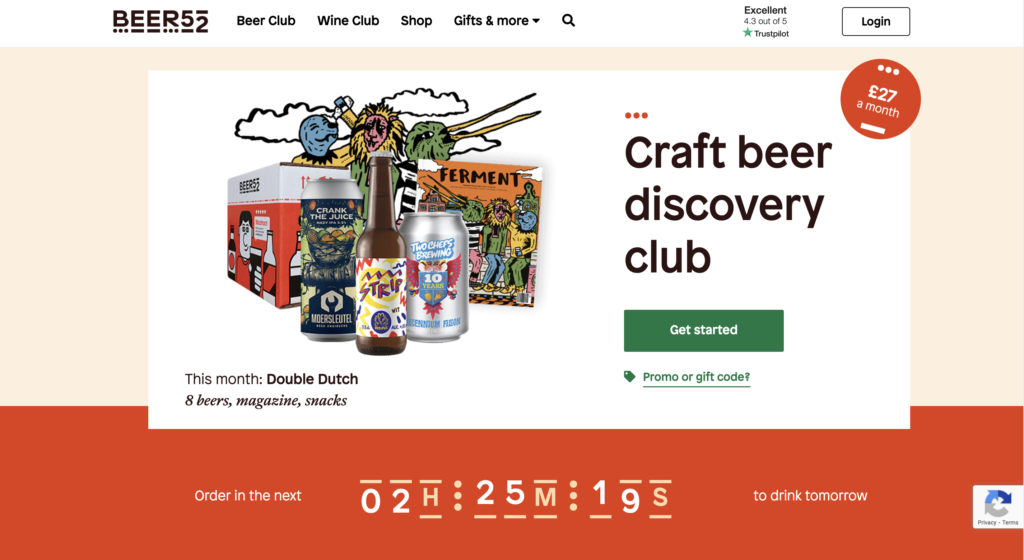
Scottish beer ecommerce brand Beer52 helps people discover delicious new craft beers with its highly anticipated monthly drops. Each themed box contains a range of beers, a copy of the brand’s Ferment magazine and a selection of snacks.
The premise of the brand’s Beer Club is explained with a simple yet engaging illustration on the homepage. Clearly summarising the subscription process like this is important for building trust in your brand and reassuring cautious consumers.
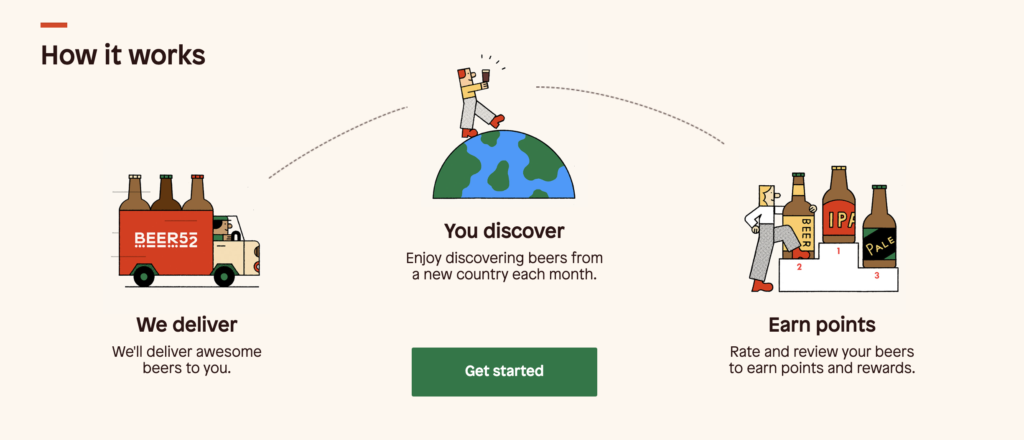
This graphic also points to some of the benefits for club members, including the convenience of home deliveries, discovery of new beers and promise of rewards. This is a great way to gently increase confidence amongst shoppers and encourage conversions.
Beer52 cleverly leverages social proof at key touch points across its Shopify store. This includes the displaying of customer reviews, star ratings, “as seen in” logos and awards badges. These elements combine to boost confidence amongst website visitors, increase perceived value and nudge prospective buyers along the sales funnel.

The company’s use of content marketing stands out, with a comprehensive blog full of useful and engaging articles and videos. It clearly demonstrates Beer52’s position as a knowledgeable authority in the beer industry, catering to curious customers who want to learn more about the science behind the brewing process.
As well as relevant topics like ‘Breweries’ and ‘Booze’, the blog covers other themes that align with customers’ wider interests, such as ‘Adventure’. This is important for positioning Beer52’s website as a go-to hub of inspiration and encouraging users to return again and again.
10. Rally
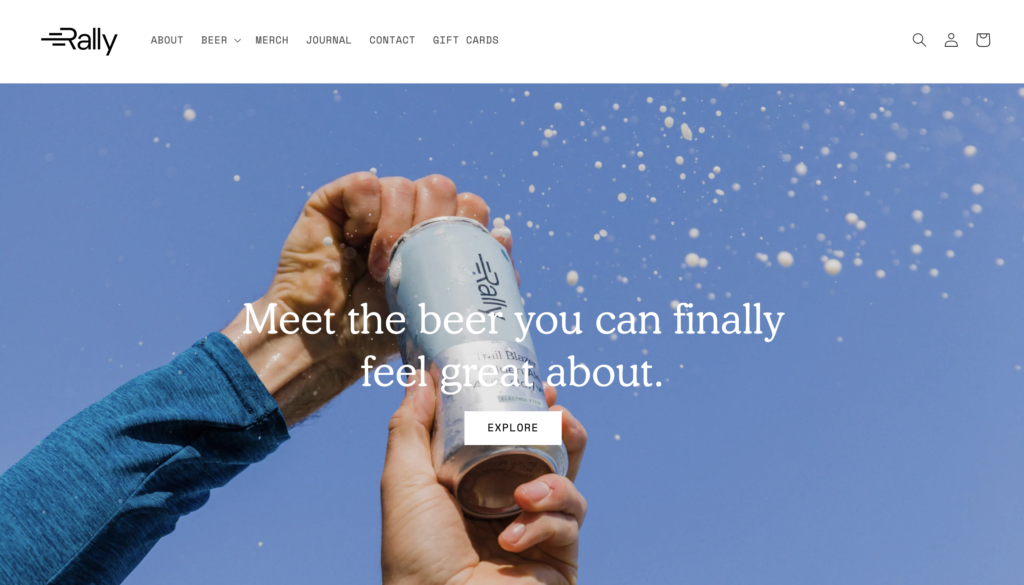
Toronto-based company Rally brews and sells beer with a difference – beer that’s “light on alcohol, big on flavour, high in electrolytes, and low in calories”. Dubbed as the “beer you can finally feel great about”, it is brewed with functional benefits from whole foods and targets those with an active lifestyle.
Not only is its beer a little different, the aesthetic of Rally’s Shopify store diverges from many of the ecommerce sites we’ve explored in this article.
For example, a combination of large, full-width imagery, white space and minimalist design create a chic, editorial vibe that stands out from other more eccentric, decorated sites.
The colour palette is muted, representing the progressiveness and modernity of Rally and its products, whilst creating a calming digital space. This is somewhat different from the vivid, saturated colours leveraged by many other beer brands.
What’s more, the site’s visual content is very much geared towards activity-themed lifestyle imagery showing people exercising in the great outdoors. This speaks to Rally’s adventurous spirit and its aim to inspire people to get outside and move.
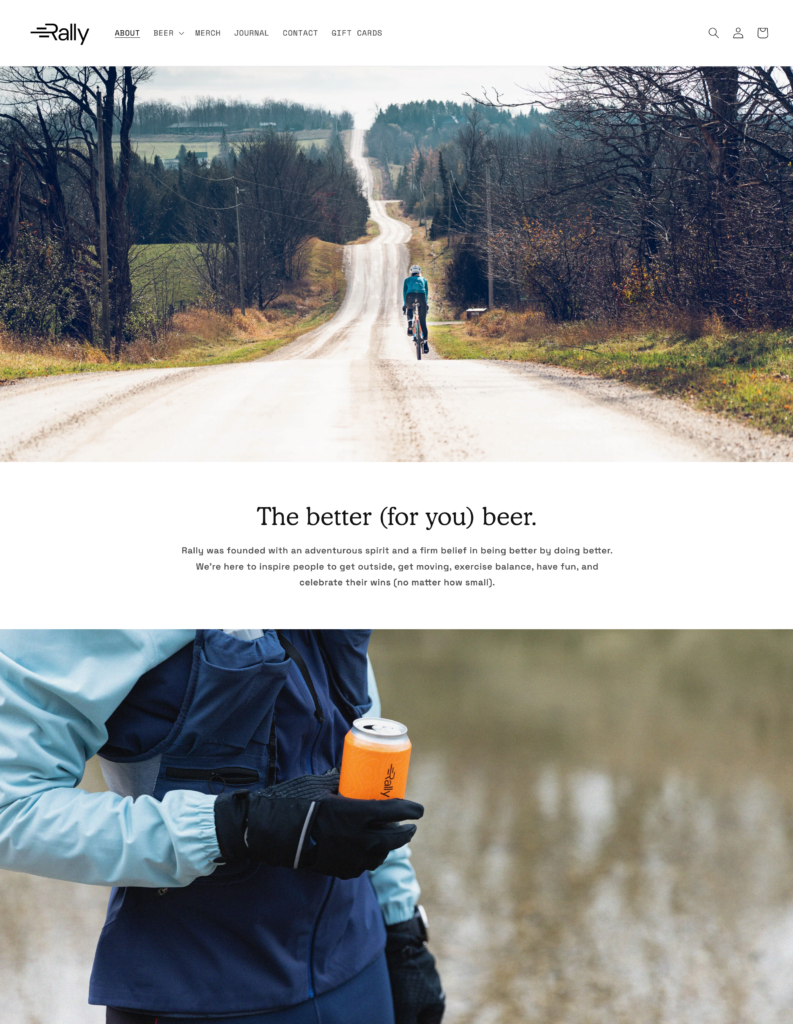
When it comes to its tech stack, the Rally ecommerce site leverages Recharge to power a non-alcoholic beer club subscription, whilst Klaviyo is the brand’s email marketing solution of choice. This is a powerful combination of tools for subscription brands, and one that we regularly recommend to our clients at Swanky.
Check out our article about non-alcoholic drinks ecommerce brands to learn more about how they utilise their tech stacks.
11. Pinter
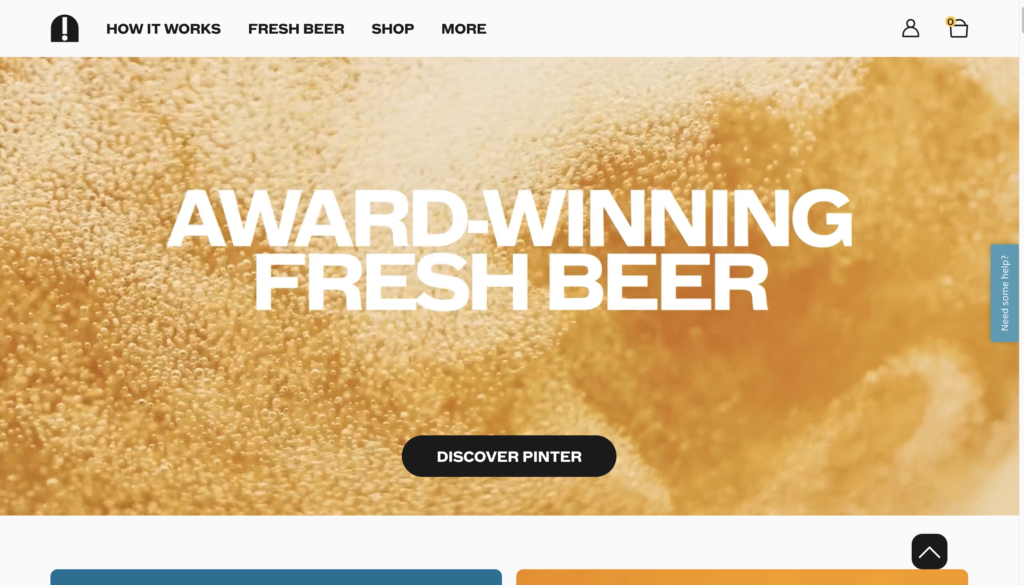
Last but not least, a tour of beer ecommerce brands using Shopify wouldn’t be complete without a nod to Pinter. The company offers beer drinkers an accessible, enjoyable and sustainable way to brew beer at home with its widely acclaimed home brewing kit.
Pinter was named the fastest-growing ecommerce brand in the UK in 2022, topping Brightpearl’s Lightning 50 list. Made for scale, Shopify is an apt fit for a company that’s growing so quickly.
The brand’s considerable impact in the industry is reflected in a bold and modern ecommerce site with striking colour scheme and strong sans serif typeface. The use of video on the homepage hero element instantly grabs attention and immerses visitors in what Pinter is all about.
Over on product pages, key details like taste, ABV, brewing time and allergen information are all clearly communicated using a blend of bold fonts, iconography and tables.
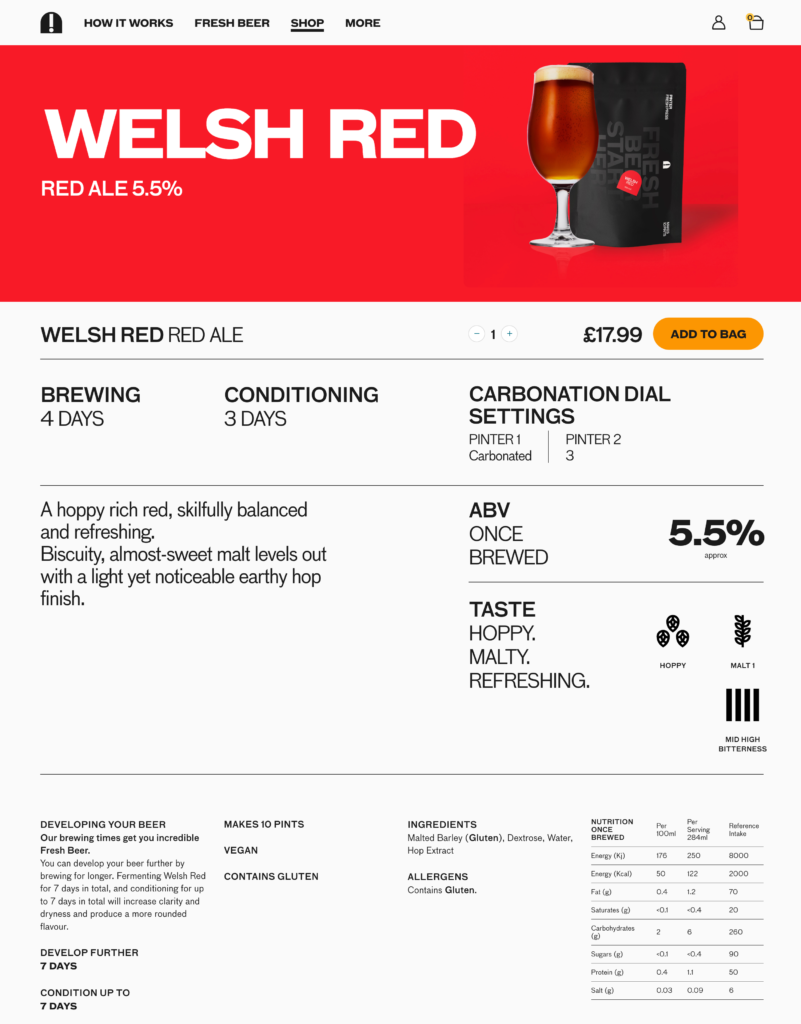
Pinter leverages referral engineering platform Mention Me to offer a refer a friend scheme. By tapping into its existing customer base and rewarding them with a £20 voucher for referring a friend, the brand can simultaneously improve its acquisition efforts whilst also improving retention rates.
On a final note, the brand’s use of social proof will no doubt be influencing purchasing decisions and encouraging conversions. This usage includes customer reviews displayed on the homepage, a “Hall of Fame” full of user-generated images, and endorsements from credible institutions like the Financial Times.
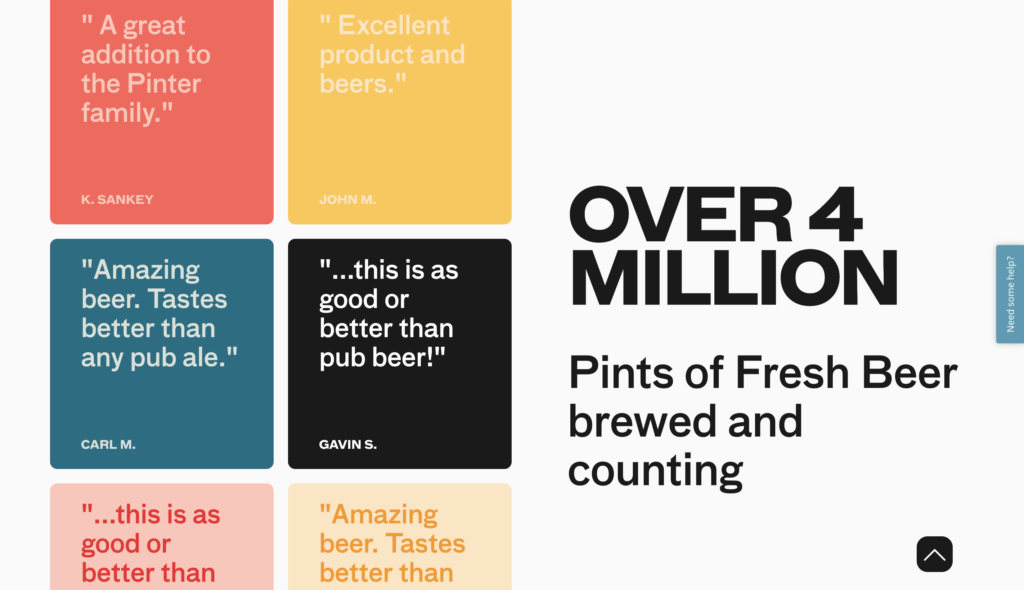
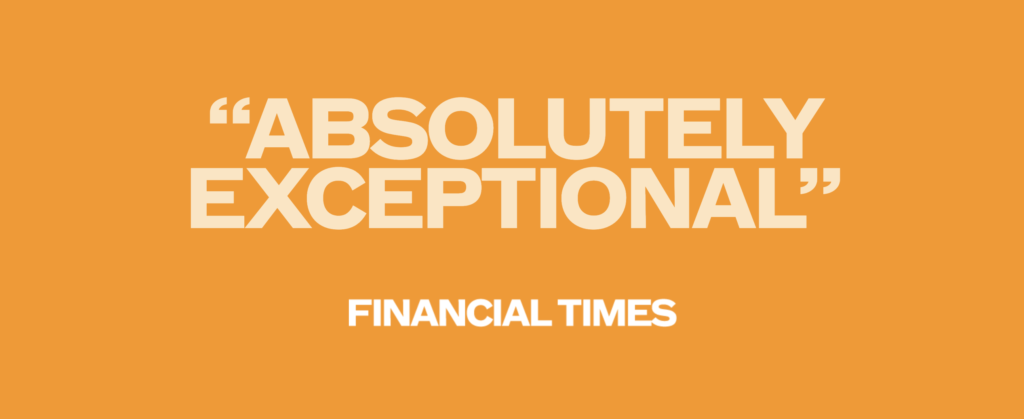
The leading Shopify DTC subscription authority for food and beverage brands
Swanky is widely regarded as the go-to Shopify Plus food and beverage agency for global DTC brands. In particular, we’re recognised for our expertise in developing and optimising bespoke subscription solutions.
If you’re looking for a full service Shopify Plus agency to help you navigate the complexities of beer ecommerce, or to drive growth with a tailored experimentation strategy, then reach out to our knowledgeable team of Shopify Plus Experts today.
For reference:
[1] https://www.forbes.com/sites/katedingwall/2021/12/22/alcohol-e-commerce-expected-to-reach-42-billion-by-2025/?sh=475b60ef1a3d
[2] https://www.theiwsr.com/beer-demand-escalates-online-key-considerations-for-brewers-refining-their-online-strategy/
[3] https://www.brewsnews.com.au/2022/06/17/bridge-road-crowdfunds-at-52m-valuation/

